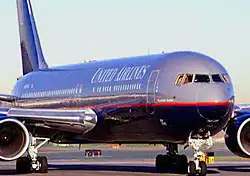
Just yesterday, I predicted to a fellow travel writer that no other airlines would follow US Airways in awarding actual flown miles for shorter flights, rather than the industry-standard practice of awarding a minimum of 500 miles.
US Airways announced its [% 2513509 | | policy change %] on Valentine’s Day, with a May 1 effect date. At the time, I characterized the move as boneheaded, and went so far as to express cautious optimism that other carriers were too smart to follow suit.
And two months later, that faith seemed justified.
Unbeknownst to me, even as that conversation was taking place, United was matching US Airways, proving that there’s no percentage in betting on the airlines’ intelligence.
Here’s the relevant portion of United’s announcement distributed yesterday via email:
To ensure that Mileage Plus miles earned toward elite status and award travel on United are aligned with actual miles flown, we are revising our base accrual policy. Beginning July 1, 2008, for flights of less than 500 miles, passengers will earn redeemable miles equal to the actual miles flown. Elite Qualifying Miles (EQM) will also be awarded based on actual miles. Elite Qualifying Segments (EQS) are not affected.
This new mileage accrual structure will apply to travel on or after July 1, 2008, regardless of when the travel was ticketed. Flights of less than 500 miles flown on or before June 30, 2008, will accrue Mileage Plus miles under the previous policy of a minimum mileage accrual per individual segment flown.
United’s logic is flawed at best. The insistence that flown miles and earned miles be “aligned” suggests that flight distances and ticket prices are aligned. The opposite is the case: In most case cases, short flights are disproportionately expensive. And indeed, that’s part of the reason consumers feel that the 500-mile minimum is fair and appropriate.
The underlying logic is murkier still. The Mileage Plus members likely to be most affected by the policy change will be business travelers flying regularly on short-haul routes to make sales or service calls. That’s a highly profitable segment of United’s market, and some of those customers will certainly shift their business to other mainline carriers that maintain a 500-minimum mile policy, or to airlines with segment-based programs like Southwest. So the change is penny-wise, pound-foolish.
The policy change won’t sink Mileage Plus. But the accumulation of such setbacks—increasingly onerous rules, more fees, etc.—is gradually stripping value from the program.
These are tough times for the airline industry. But it’s also a period of enormous opportunity. Carriers that can resist the knee-jerk impulse to cut benefits and nickel-and-dime customers are in a position to gain long-term competitive advantage and reinforce the loyalty of existing and new customers.
Instead, United has joined US Airways as a co-leader in the race to the bottom.
We hand-pick everything we recommend and select items through testing and reviews. Some products are sent to us free of charge with no incentive to offer a favorable review. We offer our unbiased opinions and do not accept compensation to review products. All items are in stock and prices are accurate at the time of publication. If you buy something through our links, we may earn a commission.
Related
Top Fares From
Today's Top Travel Deals
Brought to you by ShermansTravel
Kenya: 14-Night Tour, Incl. Tanzania &...
smarTours
 vacation
$7125+
vacation
$7125+
7-Night Caribbean Round-Trip Cruise From Orlando:...
Norwegian Cruise Line
 cruise
$789+
cruise
$789+
Ohio: Daily Car Rentals from Cincinnati
85OFF.com
 Car Rental
$19+
Car Rental
$19+



